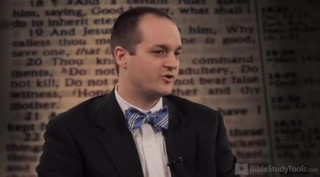
Change Translation
- Recent Translations
- All Translations
Images for Jude 1:4


Share
Videos for Jude 1:4
Jude 1:4 in Other Translations
Jude 1:4 Meaning and Commentary
For there are certain men crept in unawares
These words contain a reason why the doctrine of faith should be contended for, because of false teachers, who are described as being then upon the spot; the Apostles Peter and Paul had foretold that they would come, but Jude here speaks of them as in being; wherefore present rigour and vigilance were necessary to be used: their names are not mentioned, nor their number, only that there were "certain", or "some men"; which is done to stir up the saints to self-examination, whether they were in the faith; to diligence, in finding out these men; to vigour, in opposing them; and to care, to nip error and heresy in the bud: and they are said to have "crept in unawares": either into private houses, as was the custom of those men; or into the churches, and become members of them being the tares the enemy sows among the wheat; or into the ministry, assuming that office to themselves, without being called and sent of God; and so into the public assemblies of the saints, spreading their poisonous doctrines among them; and also into their affections, until discovered; and so the Ethiopic version reads here, "because ungodly men have entered into your hearts"; and all this was at an unawares, privily, secretly, without any thought about them, or suspicion of them:
who were before of old ordained to this condemnation;
or judgment; meaning either judicial blindness of heart, they were given up to, in embracing and spreading errors and heresies; so that these are not casual things, but fall under the ordination and decree of God, which does not make God the author of them, nor excuse the men that hold them; and they are ordained and ordered for many valuable ends; on the part of God, to show his power and wisdom; and on the part of truth, that it might be tried and appear the brighter, and to manifest his people and their graces: or else punishment is designed, even everlasting condemnation, to which some are preordained of God; for this act of preordination respects persons, and not mere actions and events; and is not a naked prescience, but a real decree, and which is sure, certain, and irrevocable; is God's act, and springs from his sovereignty, is agreeably to his justice and holiness; nor is it contrary to his goodness, and is for his glory: the date of this act is "of old"; or as the Syriac version renders it, (ayrwv Nm) , "from the beginning"; that is, from eternity; see ( 2 Thessalonians 2:13 ) ( Proverbs 8:22 ) ; for reprobation is of the same date with election; if the one is from eternity, the other must be so too, since there cannot be one without the other: if some were chosen before the foundation of the world, others must be left or passed by as early; and if some were appointed unto salvation from the beginning, others must be foreordained to condemnation from the beginning also; for these words cannot be understood of any prophecy of old, in which it was forewritten, or prophesied of these men, that they should be condemned for their ungodliness; not in ( Matthew 24:1-51 ) , in which no such persons are described as here, nor any mention made of their punishment or condemnation; nor in ( 2 Peter 2:1-3 ) ; for then the apostle would never have said that they were "of old", a long while ago, before written, or prophesied of, since according to the common calculation, that epistle of Peter's, and this of Jude's, were written in the same year; nor in the prophecy of Enoch, ( Jude 1:14 ) ; for Enoch's prophecy was not written, as we know of; and therefore these men could not be said to be before written in it; besides, that prophecy is spoken of as something distinct from these persons being before written, to condemnation; and after all, was a prophecy referred to, the sense would be the same, since such a prophecy concerning them must be founded upon an antecedent ordination and appointment of God; the word here used does not intend their being forewritten in any book of the Scriptures, but in the book of God's eternal purposes and decrees; and the justice of such a preordination appears by the following characters of them,
ungodly men:
all men are by nature ungodly, some are notoriously so, and false teachers are generally such; here it signifies such who are destitute of the fear of God, and of all internal devotion, and powerful godliness; and who did not worship God externally, according to his institutions and appointments, and much less sincerely, and in a spiritual manner; and who even separated themselves from the true worshippers of God, and gave themselves up to sensuality, and therefore their condemnation was just:
turning the grace of our God into lasciviousness;
not the love and favour of God, as in his own heart, or as shed abroad in the hearts of others; for that can never, be turned to such a purpose, it always working in a contrary way; nor the principle of grace wrought in the soul, which being of a spiritual nature, lusteth against the flesh, and cannot be turned into it; more likely the goodness of God in his providential dispensations, which is despised by some, and abused by others; but rather the doctrine of grace, which though lasciviousness is not in its nature, nor has it any natural tendency to it, yet wicked men turn or transfer it from its original nature, design, and use, to a foreign one: and they may be said to turn it into lasciviousness, either by asserting it to be a licentious doctrine, when it is not; or by treating it in a wanton and ludicrous manner, scoffing at it, and lampooning it; or by making the doctrine of grace universal, extending it equally alike to all mankind, and thereby harden and encourage men in sin.
And denying the only Lord God;
God the Father, who is the only sovereign Lord, both in providence and grace; and the only God, not to the exclusion of the Son and Spirit, but in opposition to nominal and fictitious deities, or Heathen gods; and he was denied by these men, if not in words, yet in works: the word "God" is left out in the Alexandrian copy, and in the Vulgate Latin version.
And our Lord Jesus Christ;
as his deity, or sonship, or humanity, or that he was the Messiah, or the alone Saviour, or his sacrifice, satisfaction, and righteousness; with respect to either of which he may be said to be denied doctrinally, as he is also practically, when men do not walk worthy of their profession of him; and both might be true of these men, and therefore their condemnation was righteous. The copulative "and" is omitted in the Syriac version, which seems to make this clause explanative of the former.
Jude 1:4 In-Context
Footnotes 1
- [a] Or "individuals who were marked out for condemnation"
Study Tools
PLUSUnlock Notes
This feature is for PLUS subscribers only. Join PLUS today to access these tools and more.
JOIN PLUSUnlock Highlights
This feature is for PLUS subscribers only. Join PLUS today to access these tools and more.
JOIN PLUSUnlock Bookmarks
This feature is for PLUS subscribers only. Join PLUS today to access these tools and more.
JOIN PLUSTrack Your Reading
Create a free account to start a reading plan, or join PLUS to unlock our full suite of premium study tools.
